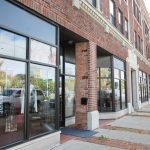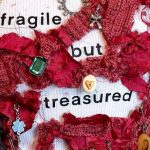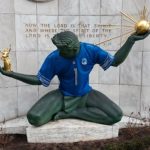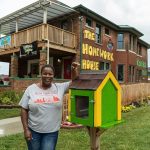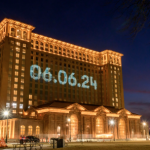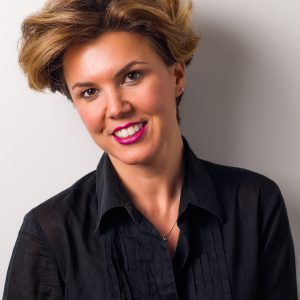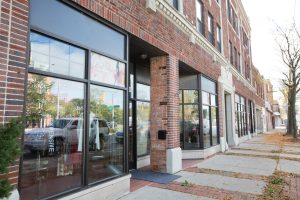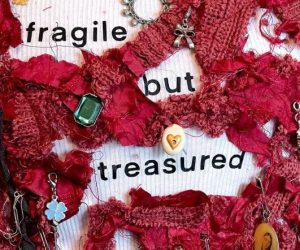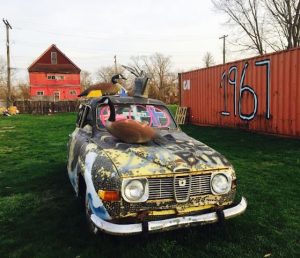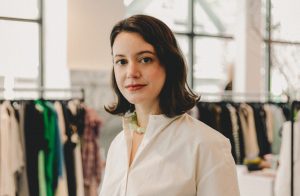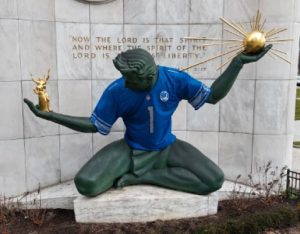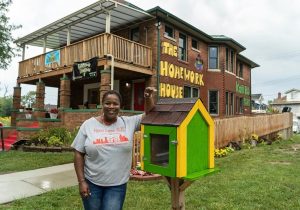Detroit Is This podcast is hosted by Ivana Kalafatic, founder of Detroitisit. The show follows thought leaders, community change agents, makers, innovators, and entrepreneurs as they share their personal and professional stories.
Through these conversations, we’ll explore opportunities and solutions for the new times we find ourselves in.
In Episode 3, Ivana speaks with Awenate Cobbina, the Vice President of Business Affairs and Associate Counsel for Palace Sports & Entertainment (PS&E) and the Detroit Pistons, and his recent appointment by Governor Gretchen Whitmer to the MEDC Executive Committee to represent Michigan businesses. During the interview, Awenate discusses his personal and professional background and what it takes to be integrated into the Detroit community.
Tune in to the podcast and subscribe to it where you normally would listen to all your podcasts, for further insight on Awenate Cobbina’s personal and professional background, his current focus on Michigan and Detroit, as well as a fresh perspective and optimism towards the Black Lives Matter movement.
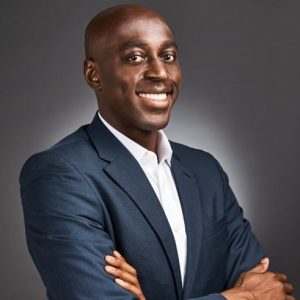
DETROIT IS THIS PODCAST EPISODE 3 WITH AWENATE COBBINA OF THE PISTONS AND MEDC
GIVE US SOME INSIGHT ON WHERE YOU CAME FROM, AND WHAT INSPIRES YOU?
My family is from Ghana, West Africa, but I was born in Philadelphia. I like to say I was raised on the East Coast, D.C. is my home, but I was born in Philly. I’ve lived in New York, New Jersey, Connecticut, Maryland, D.C., and Virginia. I went to middle school and high school in D.C. and that’s the place where I consider my home base. I did college in Atlanta because I wanted to get off the East Coast and Atlanta is just a little further south but a whole different culture. Then I went back to D.C. for two reasons. One is I thought I wanted to go to law school, but first I wanted to work a couple of years to make sure, given the time and expense, that was something worth doing. Two, I found a new appreciation for home. I think when you grow up, especially in the United States, everything seems accessible, I actually looked at the University of Michigan for college, I looked at schools in the Southeast where I ended up, and I looked on the West Coast. After trying something else, I realized, home isn’t that bad. There are a lot of universities there, Georgetown, GW, University of Maryland, Howard, which is where I ended up going to law school. I figured out during that period that I had two real interests. One is sports and the other is politics. I wanted to see how I could work in those and really, really didn’t know how at that point.
I was a political science major, I knew I wasn’t going to be a social studies teacher or professor. I thought maybe I’d go to law school, but I didn’t know what that meant. My dad was a lawyer, political writer, sole practitioner, and went to court every day. My mom went to business school and law school and worked in a corporate environment, mainly doing human resources. And so I was like, you can be a lawyer, if you go to law school, you could not be a lawyer if you go to law school. Those are the two examples that I had. So, I decided to go with the thought that I was not going to be a practicing attorney for the majority of my career, but I did want to find a way into sports or politics. And I’ve been able to find my way into both.
I worked at the National Football League’s headquarters during my first two summers in law school. I worked at the United States Senate during my third year in law school. That kind of triggered a series of events that landed me in the White House for almost six years under President Obama in a number of different offices. When I left there, I thought, again, you know, I want to try something new, get out of D.C., get off the East Coast maybe, and go back into sports. The opportunity with the Pistons presented itself in a really cool way and I have been able to be involved with the business there, which has been great to see the economic growth in Detroit over the past few years. I’ve also been able to be involved in the community side and running the Pistons Foundation.
I’m using some of the experience that I had in D.C., where the redevelopment of D.C. over the past 20 years has been stark. Downtown D.C. looks a little like it did when I grew up in a lot of good and some bad ways and in being able to be a small part of the redevelopment in Detroit, but still being able to bring the sensibilities that I have of trying to reinvent the wheel a better way this time than it was done last time, on the community side has been helpful.
HOW YOU WERE ACCEPTED INTO YOUR NEW HOME OF DETROIT AND THE IMPACT YOU COULD MAKE WITHIN THE COMMUNITY, HOW WAS THAT EXPERIENCE FOR YOU AT THE BEGINNING?
So I bought a place here. So hopefully, I’m now considered at least a partial Detroiter. One of the reasons that I like the opportunity with the Pistons is for the point that you started with, which is a lot of times and I ended up in the senior staff meeting with the White House and all of that stuff, you don’t get to meet the people who are being impacted by the policies. It’s not necessarily because your feet are on the ground, it’s just you’re working your butt off every day from 7 a.m. till you know 10 p.m. or midnight, and then you’re, you know, it’s wash, rinse, repeat. I was there for five full years, I served almost five and three quarters. So there was a partial year. Three of those five years, I worked 364 days in the office, right? Not like I was working remotely from somewhere else. I was in the office 364 days a year in 2011, and 2012 and 2013 and remember that vividly. And when you’re doing that, when you’re working that hard, it’s hard to do other things. You know, first of all, you don’t take emotional and mental health days and see family and friends and travel but also, you don’t have a lot of time to go out and meet people unless it’s in your job. So I often refer to my White House experience as great, because you get to see how decisions are made for the country, you get the 30,000-foot view. But my time in Detroit has been great as well because I get to see some of that, but I also get to make decisions that affect people and talk to the people about the decisions that affect them, whether it’s distance moving or things we’re doing in the community or otherwise.
So I think to answer the second part of your question, partly because I came in through the Pistons, I did get a relatively warm welcome. I made sure very purposefully to listen before I talk, just because I think Detroiters are a proud bunch and one thing that they don’t like is people that come in and think that they know about Detroit. Still, I try to wait until I am asked before I give my opinion because the opinion formed in other places, but I think some of it has relevance and maybe some of it doesn’t. So I got a pretty warm welcome when I came, partly because I took the extra step of calling all my friends in D.C. in New York and Atlanta saying, Hey, we’re pretty good friends, right? They’d respond yeah and then I’d say, give me one person that you know that grew up in Detroit, went to University of Michigan, Michigan State or Eastern or Central, someone with a Michigan and Detroit tie, and that’s all I’m asking. I’m not asking for money. I’m not asking for you to visit, you can if you want, I just want one warm handoff, so that I know someone on the ground because I knew two people when I moved here.
WHAT IS YOUR DEFINITION OF HOME?
I think for me, it’s the people. I didn’t count the states as I was living in them, but I’ve lived in probably almost 10 states. I’m very detached and disconnected from the places that I’m living physically, an apartment is just an apartment. I bought a home but it’s still just a home that I’m not going to be sad when I sell or if I stay for 30 years, I’ll be fine with that too. I think it’s the people that really make a difference and the people here have been tremendous. Everyone that’s here wants to be here. They, for the most part, have had opportunities to move either to the suburbs or in the case of transplants, they’ve come from other places, whether it’s for family or jobs. So you feel that pride of living in Detroit and being around a community who may have different views of how to make Detroit better and what the future looks like in Detroit, and I believe they genuinely want to make it better and want the future to be great.
I previously said that I don’t care about the place of a home, but I live in Lafayette Park and it’s a pretty cool place. I didn’t really realize that until COVID-19. Staying in my townhome looking at some of the architecture around, I went on the MoMA site, went out every day in the park, and sometimes I just lay on a blanket to get outside. Other times, I use the park as my track and run around the outside. And you know, I didn’t need to leave and I also didn’t feel constrained. So it was great to be in that place during that time and it’s a great community as well. People that have been there whose families have been there since it opened in the ’50s, to people that I know who were more recent transplants but found Lafayette Park to be great as well. It’s so interesting to just walk around and see that community and really, at least from what I’ve heard from some of the residents that have been there for a long time, it hasn’t changed that much. Mostly because the buildings are static, they’re not moving. But they’ve always it’s a co-op state. They interview people and try to get good people in there. I’m lucky I got in.
HOW DO YOU LOOK AT WHAT IS CRITICAL IN TEAM SPORTS IN TERMS OF COMMUNITY?
There are two big parts of my responsibility for the Pistons, one is working on our team that tries to find new ventures and long term business planning, which led to us moving from the Palace to Little Caesars Arena to play our games and also moving our employees from the Palace offices to our the Pistons Performance Center in New Center, Detroit. We’ve kind of redone the Foundation, even before we moved to Detroit, to make sure that it was more in line with some of the programming that we were doing, and reaching people in Detroit, which has been a focus of ours. We think about our platform as when you think of the Pistons, what do you think of and you named a lot of it, it’s, we’re able to bring people together. We gather on the community side, we’re able to bring people together at games, we’re able to bring people together at water coolers to talk about the game last night or what the team should do. At its core, sports are important because they bring people together. And so we think how do we use that platform to win games and excite people but also to do the right thing for our business and for the community? Moving to Detroit was an important part of that. There was a disconnect between fans in the city and, and the Pistons which I think that if we haven’t solved, we’re working to solve.
I know that the Palace had a lot of great memories and a lot of people were sad to see it go, but this is one of the ways that I think my being from somewhere else was helpful. I had no idea where Auburn Hills was until I got here. After my job interview, I got a cab to take me to Auburn Hills and $110 later, I was in Auburn Hills, which is still the most effective. Then, talking to people around the city that loved the Pistons and had never or rarely been to a game because of the distance was disheartening. I know that Auburn Hills had a lot of great memories, but I think there will be some created in Detroit as well. And to the extent that Detroit does well, I think that the area and the state will also do well. There’s economic development in Albany, even though it’s the capital it is much less important than economic development. New York City, right. That’s the biggest city, Detroit needs to be that shining star.
On the community side, we really had to think about how to bring people together and have the most impact. We think of that through partnerships. So in the past, Mr. Davidson was very generous, an organization would ask for $5,000, $10,000 or $20,000 and the Pistons would do it. But there was no real strategy behind it. We knew that that money was helping organizations, we didn’t know-how. And so what we’ve tried to do in the last five years that I’ve been here is, have a strategy behind what we’re giving. Not that we won’t give to anyone but there are certain areas that we can add to, in addition to the money to make that gift more valuable. So whether that’s health and fitness, especially basketball, but really any sport and making sure kids are active, education, mentoring equality generally, which is what we put on our social justice initiatives under, Black History Month, and our quality platform Women’s History Month, Hoop For Troops which is our veteran’s platform. That all fits under equality. We want to make sure that we’re really able to give more than a dollar. So we’ll give a dollar to organizations and we’ve actually increased our giving almost eightfold since I’ve been there. But we are also more targeted when we give, make sure that we can highlight them through our social media platform because we know the work that we’re doing, we can highlight them at a game and bring out either the participants or the leaders who thought of these innovative programs, we can partner with them off the court and have our players show up and have them involved, which were not things that we could do regularly before just because we weren’t true partners. It was more of a grant or grantee relationship as opposed to a full partnership relationship.
You need metrics to make sure things are working. If you are throwing money down endlessly, you are wasting their time and yours. So, how are we tracking what we are doing so that the outcomes that we want are happening? If we’re not it doesn’t mean you have to move away from that organization or individual, it means you have to try stuff that works for them too.
COMING FROM GHANA, AFRICA, WHAT DO YOU SEE HAPPENING NOW IN THE BLACK COMMUNITY IN AMERICA?
I am hopeful but not optimistic. Growing up black in America is a unique experience, my parents had a different experience growing up in Ghana so I did not have the mentorship in that regard. I had to figure it out on my own with my friends who may have had parents that were born in the States and had that history. As kids, you’re just kids, and in my lifetime, that is where the hope comes from but I don’t want to get my hopes up because there is so much work to be done in every area of life. I am cognizant of the fact that police brutality and the killing of black men and women is just one area that needs to be fixed. There is the entire criminal justice system, which I know all too well as a lawyer, and economic opportunity, housing, and community building. Even in sports, the NBA only has one black owner and it is Michael Jordan. I don’t believe the NFL, NHL, or MLB have any. That makes it tough to have role models on the business side. I do think that the fact that we can have this conversation where even two months ago we might have been more hesitant to have it is a sign of progress but I want progress to continue for black Americans and black people around the world and but also for others who are discriminated against in various forms. I think those conversations need to be had as well. I think this is the moment for us to come to terms with how black Americans are treated by police and how black Americans are treated by their fellow citizens and hopefully something good comes out of it.
This is incomplete as well, but the #MeToo Movement, I think that movements are far from perfect, everyone has their different views of what the movement and protest should be and I’m not a woman, so please correct me if I am wrong. As a woman in the United States, I believe, from talking to my mom, cousin, and friends, that they would now feel more comfortable reporting a co-worker or really anyone in the public that treated them inappropriately. Versus, if it was three years ago maybe you would do it if it was a date but if it was in the workplace you might worry about losing your job. We are far from solving it but I hope we are one, two, or three steps better than we were a few years ago, and I hope the same for black issues as well.
WHAT IS GHANA LIKE?
It is laid back. Ghana is very prideful, similar to Detroit. The capital, if you went there it would feel like any European city. The restaurants, parties, bars are good. There is a lot of inequality as well. The poor are very poor and relative to here, the rich are very rich.
I think as development continues and more jobs continue to go to Ghana and the taking of resources that was happening through European countries stops and Ghana has control of its own natural resources, things will get better. When it was a British colony it was the gold coast, a lot of the world’s gold comes from Ghana which is obviously a valuable commodity. Now, they are getting some funds for it. Ghana is so much fun, it’s on the water, there are beaches, lots of history, I would recommend to anyone to go there as their first or second trip to Africa.
WHAT ABOUT YOUR APPOINTMENT TO REPRESENT BUSINESSES THROUGH THE MEDC FOR THE NEXT FOUR YEARS BY THE GOVERNOR?
It’s interesting, the MEDC is a public-private partnership agency with some private funds and some government funds. The goal is to promote Michigan, the Pure Michigan campaign that everyone has seen runs through MEDC, then there is the community building goal, making sure that town centers around the state are where people want to live and lastly, for job attraction and job growth. So making sure that businesses large and small look at Michigan as a place where they can do business and find a spot in Michigan that can fit their needs.
I had some interaction with them while going through our process of constructing and heading to Little Ceasars Arena and our headquarters so I knew about the organization before I was appointed to the board as board chair. Since then I have really tried to take advantage of the diversity of opinions on the board and talk to them about what their community needs and being a spokesperson on the board for Detroit to make sure Detroit gets the resources it needs to become the city it can be in the twenty-first century.
Tune in now and subscribe to Detroit Is THIS where you normally would listen to all your podcasts to learn more about Detroit’s thought leaders, innovators, and entrepreneurs!
Follow us and discover more of our podcasts on:
Facebook https://www.facebook.com/detroitisit/
Twitter @Detroitisit
Instagram @detroitisit
LinkedIn https://www.linkedin.com/company/detroitisit
Apple podcasts @DetroitisitThis
Spotify @DetroitisThis






